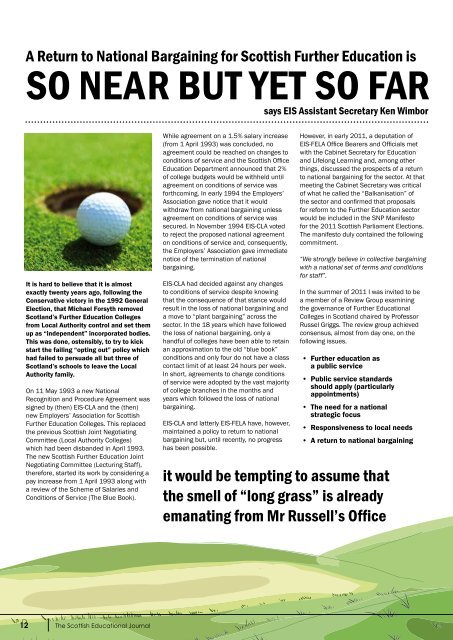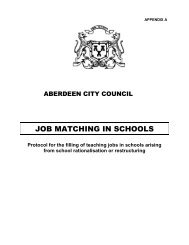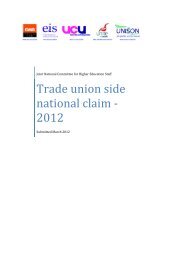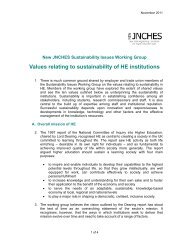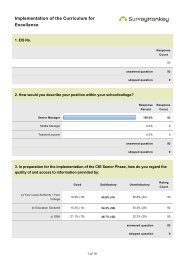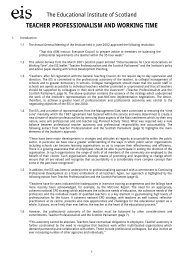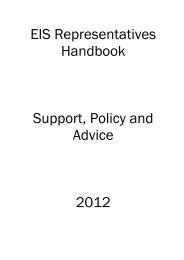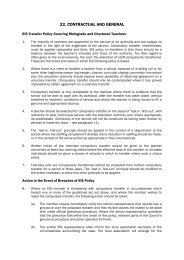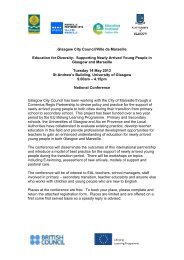The Scottish Educational Journal - EIS
The Scottish Educational Journal - EIS
The Scottish Educational Journal - EIS
Create successful ePaper yourself
Turn your PDF publications into a flip-book with our unique Google optimized e-Paper software.
A Return to National Bargaining for <strong>Scottish</strong> Further Education is<br />
SO NEAR BUT YET SO FAR<br />
says <strong>EIS</strong> Assistant Secretary Ken Wimbor<br />
It is hard to believe that it is almost<br />
exactly twenty years ago, following the<br />
Conservative victory in the 1992 General<br />
Election, that Michael Forsyth removed<br />
Scotland’s Further Education Colleges<br />
from Local Authority control and set them<br />
up as “independent” incorporated bodies.<br />
This was done, ostensibly, to try to kick<br />
start the failing “opting out” policy which<br />
had failed to persuade all but three of<br />
Scotland’s schools to leave the Local<br />
Authority family.<br />
On 11 May 1993 a new National<br />
Recognition and Procedure Agreement was<br />
signed by (then) <strong>EIS</strong>-CLA and the (then)<br />
new Employers’ Association for <strong>Scottish</strong><br />
Further Education Colleges. This replaced<br />
the previous <strong>Scottish</strong> Joint Negotiating<br />
Committee (Local Authority Colleges)<br />
which had been disbanded in April 1993.<br />
<strong>The</strong> new <strong>Scottish</strong> Further Education Joint<br />
Negotiating Committee (Lecturing Staff),<br />
therefore, started its work by considering a<br />
pay increase from 1 April 1993 along with<br />
a review of the Scheme of Salaries and<br />
Conditions of Service (<strong>The</strong> Blue Book).<br />
While agreement on a 1.5% salary increase<br />
(from 1 April 1993) was concluded, no<br />
agreement could be reached on changes to<br />
conditions of service and the <strong>Scottish</strong> Office<br />
Education Department announced that 2%<br />
of college budgets would be withheld until<br />
agreement on conditions of service was<br />
forthcoming. In early 1994 the Employers’<br />
Association gave notice that it would<br />
withdraw from national bargaining unless<br />
agreement on conditions of service was<br />
secured. In November 1994 <strong>EIS</strong>-CLA voted<br />
to reject the proposed national agreement<br />
on conditions of service and, consequently,<br />
the Employers’ Association gave immediate<br />
notice of the termination of national<br />
bargaining.<br />
<strong>EIS</strong>-CLA had decided against any changes<br />
to conditions of service despite knowing<br />
that the consequence of that stance would<br />
result in the loss of national bargaining and<br />
a move to “plant bargaining” across the<br />
sector. In the 18 years which have followed<br />
the loss of national bargaining, only a<br />
handful of colleges have been able to retain<br />
an approximation to the old “blue book”<br />
conditions and only four do not have a class<br />
contact limit of at least 24 hours per week.<br />
In short, agreements to change conditions<br />
of service were adopted by the vast majority<br />
of college branches in the months and<br />
years which followed the loss of national<br />
bargaining.<br />
<strong>EIS</strong>-CLA and latterly <strong>EIS</strong>-FELA have, however,<br />
maintained a policy to return to national<br />
bargaining but, until recently, no progress<br />
has been possible.<br />
However, in early 2011, a deputation of<br />
<strong>EIS</strong>-FELA Office Bearers and Officials met<br />
with the Cabinet Secretary for Education<br />
and Lifelong Learning and, among other<br />
things, discussed the prospects of a return<br />
to national bargaining for the sector. At that<br />
meeting the Cabinet Secretary was critical<br />
of what he called the “Balkanisation” of<br />
the sector and confirmed that proposals<br />
for reform to the Further Education sector<br />
would be included in the SNP Manifesto<br />
for the 2011 <strong>Scottish</strong> Parliament Elections.<br />
<strong>The</strong> manifesto duly contained the following<br />
commitment.<br />
“We strongly believe in collective bargaining<br />
with a national set of terms and conditions<br />
for staff”.<br />
In the summer of 2011 I was invited to be<br />
a member of a Review Group examining<br />
the governance of Further <strong>Educational</strong><br />
Colleges in Scotland chaired by Professor<br />
Russel Griggs. <strong>The</strong> review group achieved<br />
consensus, almost from day one, on the<br />
following issues.<br />
• Further education as<br />
a public service<br />
• Public service standards<br />
should apply (particularly<br />
appointments)<br />
• <strong>The</strong> need for a national<br />
strategic focus<br />
• Responsiveness to local needs<br />
• A return to national bargaining<br />
it would be tempting to assume that<br />
the smell of “long grass” is already<br />
emanating from Mr Russell’s Office<br />
12 <strong>The</strong> <strong>Scottish</strong> <strong>Educational</strong> <strong>Journal</strong>


